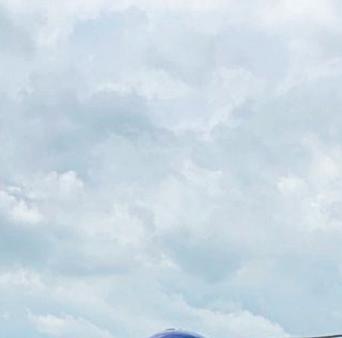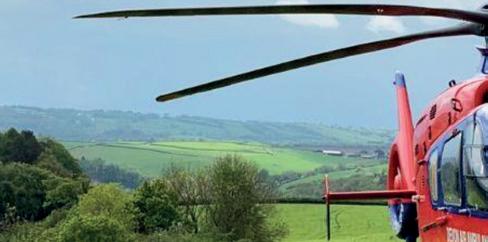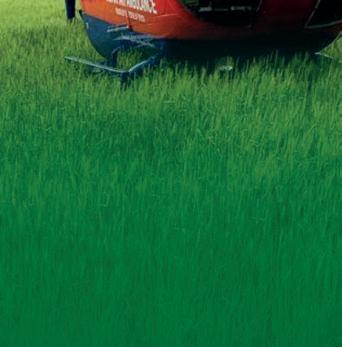
7 minute read
One year on Operations Director Nigel Hare refl ects on an unprecedented year full of challenges and opportunities for our clinical and aviation teams

One Year On
Advertisement


Operations Director Nigel Hare takes a look back on an unprecedented year full of challenges for our operational teams

As I write the content for this edition of Helipad, it is the fi rst anniversary of the start of the fi rst COVID-19 lockdown. Exactly a year later, we all fi nd ourselves in the current lockdown, but with a much brighter outlook ahead of us.
Although certainly not an anniversary to celebrate, the signifi cant additional work that the team at Devon Air Ambulance has undertaken to overcome the challenges throughout the pandemic, as well as the continuing support from you, our supporters, is testament to the commitment we all have to keep our lifesaving service operational. At the end of March, we took the diffi cult decision to temporarily cease responding using our two helicopters as we could not ensure the safety of our patients and crew due to the confi ned space inside the helicopters. With pilots not permitted to wear PPE for fl ight safety reasons, and patients on our aircraft stretcher being less than one metre away from the pilot, we couldn’t adequately protect either. Although it was diffi cult having to consider suspending our helicopter service, the safety of our patients and staff had to be our fi rst priority. We switched to responding to patients using just our recently introduced Critical Car Cars to ensure we were still able to respond to patients in their time of need.
Being open in communicating our decision, and the reasons why we made it, meant we received off ers of help that would otherwise not have been forthcoming. One such off er came from Babcock Marine at Devonport Dockyard and, in discussing with them the challenges we faced in keeping our patients and staff safe in the helicopter, this led to the development of a separation screen, something Babcock usually produced for nuclear submarines. Sadly, we are all too familiar now with separation screens, however, at the start of the pandemic, the idea of designing and fi tting one inside a helicopter to provide protection against an airborne virus, was groundbreaking. Our Helicopter Services team were not put off by the challenge and alongside the Civil Aviation Authority and a diff erent division within Babcock, ‘Babcock Mission Critical Services Onshore’ who operate Air Ambulances elsewhere in the UK, our helicopters were examined and measured, prototypes were designed, and within weeks a fully approved separation screen was fi tted to both our helicopters and we


started to respond by air again. transfer patients. Volvo UK kindly loaned us a vehicle during
Collaborating in innovation like this has enabled many the COVID-19 surges, which enabled us to provide an other air ambulance services to also benefi t through the additional Critical Care Car team at the time when demand fi tting of a separation screen within their helicopters. Both for medical help in the community was at its highest. Babcock and Devon Air Ambulance received recognition for Summer is always a busy time for Devon Air Ambulance; this collaboration by winning a special ‘COVID-19 Response however, 2020 was particularly so as we helped an increasing award’, at the Institute of Collaborative Working (ICW) Awards. number of patients who sustained serious injuries or were
However, this hasn’t been the only collaboration or suff ering from life-threatening medical conditions. This higher innovation that has taken place to help keep our service than normal level of call-outs coincided with the recordresponding to patients safely. We were truly humbled by breaking high temperatures the country experienced. the support of many businesses, volunteers and supporters Treating patients in high temperatures and operating who, between them, designed and 3D printed face shields, in a helicopter, which due to the number of windows, is donated PPE, switched from producing gin to hand sanitiser eff ectively like fl ying in a greenhouse, is demanding at the or helped deliver these essential items to us. best of times. However, 2020 was even more demanding
It is clear now that just like every other healthcare provider, for our clinical team as they also had to wear full PPE when not just in this country but across the world, we did not realise doing so. Delivering care, lifting and carrying patients and this time last year the extent and duration that the COVID-19 equipment and undertaking procedures such as CPR in fl uid pandemic would impact our service. repellent suits, respirator masks, goggles and two layers of
Throughout February and March 2020, as the devastating vinyl gloves, was often exhausting for the team. It was also impact of the virus became known, we started developing and very uncomfortable as the inevitable sweat was not able to introducing additional safety processes and sought to secure evaporate and could not be wiped away from the forehead enough PPE to keep due to the need to everyone safe. We managed to procure “ I would like to take the opportunity to say prevent the risk of cross-infection, and additional PPE suffi cient thank you to you, our supporters, and everyone so would run into and to last us around fi ve years at our normal rate at Devon Air Ambulance who have worked around the eyes. Working tirelessly of use. Sadly, the scale tirelessly to keep our service operational and behind the scenes, of the pandemic and enabled us to continue to treat our patients often unnoticed, our the safety processes we needed to put in place safely and with dignity and respect, despite the support staff have also faced and overcome meant that we used challenging circumstances and the wearing of many challenges. all that PPE is just two weeks. often intrusive face masks and PPE ” Developing new processes, ensuring
As the pandemic our equipment is hit its fi rst peak during 2020, the number of patients we maintained and delivering training all required new ways of responded to increased. As Devon’s hospitals and the working. One particular challenge has been the constant focus South Western Ambulance Service NHS Foundation Trust on ensuring we have enough PPE for our clinical team to keep faced unprecedented pressures, we were able to provide them and our patients safe. This has at times been a daily/ additional support to patients by assisting these vital services. weekly challenge and, although we have never run out, there The closure of universities and the shut down of training have been a few occasions where we were very anxious as to facilities, alongside other changes we made to free up whether we would have enough to keep everyone safe. members of our team, meant that we created the capacity to In amongst all this, we brought into service our new H145 provide additional support to even more patients, as well as helicopter. No small task at the best of times, but very continuing to provide our normal Air Ambulance provision. challenging during the pandemic. The new helicopter has
We released some of our doctors back to the NHS hospitals already made a signifi cant diff erence to our ability to help where they also worked, while other doctors supported the patients and will continue to do so for many years to come. ambulance service within their COVID emergency command I would like to take the opportunity to say thank you to you, centre. Some of our paramedics helped to develop the our supporters, and everyone at Devon Air Ambulance who critical care transfer service to support Exeter’s Nightingale have worked tirelessly to keep our service operational and hospital, which would enable anaesthetised patients to be enabled us to continue to treat our patients safely and with safely transferred between it and other hospitals within dignity and respect, despite the challenging circumstances the South West. As this provision developed our support and the wearing of often intrusive face masks and PPE. To staff maintained ready to use the medical equipment and you all, with a special mention to my team within Patient electronic medical devices that would be used to safely Services - Thank you for enabling us to continue to save lives!
Operations
Meet: Nigel Hare - Operations Director










